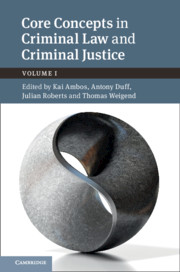Book contents
- Core Concepts in Criminal Law and Criminal Justice
- Core Concepts in Criminal Law and Criminal Justice
- Copyright page
- Contents
- Preface
- Abbreviations
- Contributors
- Part I Introduction
- Part II Criminal Law
- 2 Omissions
- 3 Preparatory Offences
- 4 Participation in Crime
- 5 Consent in the Law Relating to Sexual Offences
- 6 Terrorism Offences
- Part III Criminal Justice and Procedure
- Index
- References
3 - Preparatory Offences
from Part II - Criminal Law
Published online by Cambridge University Press: 19 December 2019
- Core Concepts in Criminal Law and Criminal Justice
- Core Concepts in Criminal Law and Criminal Justice
- Copyright page
- Contents
- Preface
- Abbreviations
- Contributors
- Part I Introduction
- Part II Criminal Law
- 2 Omissions
- 3 Preparatory Offences
- 4 Participation in Crime
- 5 Consent in the Law Relating to Sexual Offences
- 6 Terrorism Offences
- Part III Criminal Justice and Procedure
- Index
- References
Summary
To establish the importance of ‘preparatory offences’ to a book of this sort, it is necessary to define that concept. ‘Preparatory offences’ is not a formal category in English or German criminal law. At the most general level, preparatory offences criminalise conduct perceived to carry the risk that, in the future, a ‘completed’ crime will be committed. Preparatory offences move criminal responsibility back from the actual occurrence of harmful conduct to the planning and preparation stage – conduct that ‘pre-dates’ the completed offence, and is often quite remote from the threatened harm.
- Type
- Chapter
- Information
- Core Concepts in Criminal Law and Criminal Justice , pp. 54 - 93Publisher: Cambridge University PressPrint publication year: 2020
References
- 2
- Cited by



